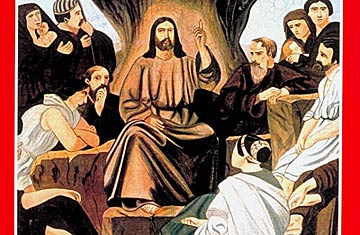
(7 of 11)
In California, the Berkeley Christian Coalition evolved from a wing of the Jesus Movement revival that dealt with the street people, university students, hitchhikers, political radicals and occultists found nowadays in large college communities. It runs a free university, a youth ranch, a drop-in hostel, a street drama troupe, the sprightly Radix newspaper, and the unique Spiritual Counterfeits Project, which acts as a watchdog on Oriental and occult movements in the U.S. "Our objective," says S.C.P. Director Brooks Alexander, 41, "is to expose and counter the broad patterns of spiritual deception within our culture."
Bearded, blue-jeaned and barrel-chested, Alexander pursues his work with a zeal worthy of the Grand Inquisitor. Like his two assistants, he was involved in the hippie movement, then found Jesus and set up a mission in the Haight-Ashbury wilderness. "We told the protesters that they were fundamentally right in their critique of society but that their answers were inadequate." He was accused of being a fascist, or a pawn of the FBI.
Like Evangelicals generally, Alexander believes in the Second Coming and the end of the world, and he regards humanist faith in progress as naive. Says he: "The most elaborate programs are useless when compared to the simple training of the heart." He is little impressed by the spectacle of what he calls the "Christ circuses" put on by some other Evangelicals. "This is a grass-roots movement of Christian faith which is riding a reaction to dead churches."
One of the most spectacular and prosperous of the new centers, however, also grew out of the Jesus Movement: Chuck Smith's Calvary Church downstate in Costa Mesa, Calif. A liberal writer in Christian Century snaps that the church "churns out ignorance and hysteria," but in the pulpit Smith is actually a balding Everyman, leading hymns with only modest gestures and offering unvarnished Bible lectures accompanied by a disarmingly broad smile. "People come here because God is explained to them in a way they can understand," says Smith. They can also understand Christianity in action. Calvary sponsors homes for separated wives and for children having trouble with parents, counseling for parents and vocational training. Smith points to an 85% recovery rate for youths with drug problems "once they find the Lord." Confirming the claim. Franklin Jones, a psychiatrist who heads the methadone program at nearby Brea Hospital says: "My own program is a failure. I came here because they're taking kids off heroin cold turkey. What's more, they stay off."
In the size and speed of its growth, in the range of needs to which it caters, in the promises and visions it offers, Pastor Smith's Calvary conglomerate illustrates both the dangers and the opportunities implicit in the success of the Evangelical movement. Smith started Calvary eleven years ago
